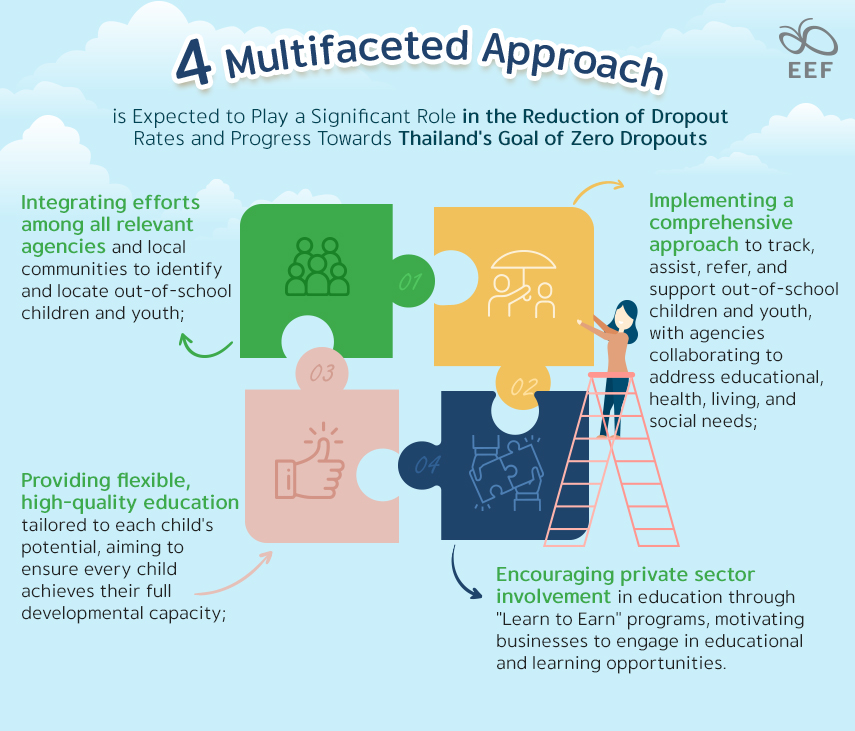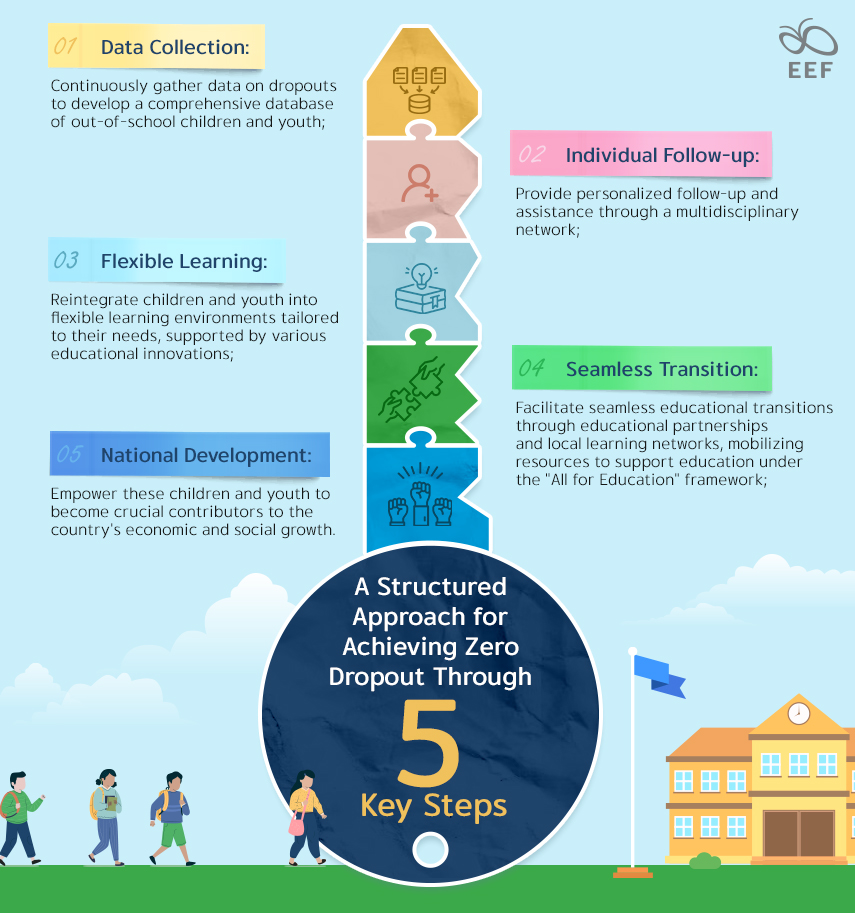
Following the Cabinet Resolution on Thailand Zero Dropout (TZD) on May 28th, 2024, Former Prime Minister Srettha Thavisin emphasized the urgency of the TZD policy. In this regard, he outlined four key measures aimed at reintegrating out-of-school children and youth: identifying and locating; tracking and supporting; providing flexible quality education; and encouraging private sector involvement in education. These measures are pivotal in advancing the TZD initiative. By creating a coordinated and supportive framework, they ensure that out-of-school children and youth receive comprehensive assistance, from identification through to education and beyond. Tailoring education to individual needs and leveraging private sector engagement aims to address barriers that contribute to dropout rates, fostering a flexible educational environment where every child has the opportunity to thrive academically and professionally, and bridging the gaps between education and employment. This multifaceted approach is expected to significantly reduce dropout rates and drive Thailand closer to achieving its zero-dropout goal.

4 Multifaceted Approach is Expected to Play a Significant Role in the Reduction of Dropout Rates and Progress Towards Thailand’s Goal of Zero Dropouts
- Integrating efforts among all relevant agencies and local communities to identify and locate out-of-school children and youth;
- Implementing a comprehensive approach to track, assist, refer, and support out-of-school children and youth, with agencies collaborating to address educational, health, living, and social needs;
- Providing flexible, high-quality education tailored to each child’s potential, aiming to ensure every child achieves their full developmental capacity;
- Encouraging private sector involvement in education through “Learn to Earn” programs, motivating businesses to engage in educational and learning opportunities.
The Prime Minister’s statement was made in the wake of the landmark TZD MOU signed on the same day by 11 key agencies, namely the Ministry of Education, the Ministry of Interior, the Ministry of Education, the Ministry of Digital Economy and Society, the Ministry of Social Development and Human Security, Ministry of Public Health, Ministry of Labour, Ministry of Justice, Bangkok Metropolitan Administration, the National Health Security Office, Thailand Professional Qualification Institute (Public Organization), and the Equitable Education Fund (EEF) Thailand. This monumental agreement represents a major social commitment to equitable educational opportunities for all Thai children. Notably, it outlines a structured approach to achieving zero dropout involving five key steps: data collection on dropouts, individual follow-up, flexible learning, seamless transition, and national development. Addressing the dropout crisis aims to counteract significant economic losses and social inequality, with successful reintegration potentially boosting GDP by up to 1.7% annually.

A Structured Approach for Achieving Zero Dropout Through 5 Key Steps
- Data Collection: Continuously gather data on dropouts to develop a comprehensive database of out-of-school children and youth;
- Individual Follow-up: Provide personalized follow-up and assistance through a multidisciplinary network;
- Flexible Learning: Reintegrate children and youth into flexible learning environments tailored to their needs, supported by various educational innovations;
- Seamless Transition: Facilitate seamless educational transitions through educational partnerships and local learning networks, mobilizing resources to support education under the “All for Education” framework;
- National Development: Empower these children and youth to become crucial contributors to the country’s economic and social growth.
The TZD MOU marks a pivotal advancement in Thailand’s educational reform, placing the issue of out-of-school children and youth at the forefront of national priorities. This agreement signals a paradigm shift in the approach to addressing educational dropouts, emphasizing the need for coordinated efforts from all involved entities — ranging from local communities to national institutions — to achieve practical and effective outcomes. Central to this MOU is the primary focus on data collection, specifically annual updates of out-of-school data. This strategic emphasis will drive Big Data Analytics, enabling the prediction and prevention of dropout risks through the integration of parental data for timely interventions. This highlights the importance of harnessing “Local Community” and “Live Data” as essential components in achieving the TZD initiative. By tapping into these resources, tailored support and tracking for children and youth who have yet to be integrated back into the educational system will be enhanced, advancing toward a more proactive, responsive, and inclusive educational strategy.
Recent data integration from 21 educational agencies and civil registration records revealed a staggering 1,025,514 children and youth aged 3-18 unaccounted for in the 2023 academic year. This figure may seem substantial, but it averages fewer than 10,000 unaccounted-for individuals per province — a manageable number for local mechanisms given each province’s population. Nevertheless, the success of reintegration of these out-of-school children and youth back into the educational fold hinges on the strength of local systems. In response, a nationwide initiative will commence in the 2024 academic year, spearheaded by the “Thai Zero Dropout” — an application designed to aid in identifying, planning, and assisting these children, ensuring comprehensive tracking and support nationwide, at both local and national levels.

The forthcoming “Thai Zero Dropout” application, set to debut this September, will revolutionize educational support by providing “live” data. This innovative tool will empower local communities to survey, plan, assist, and track individual cases across the country. Transforming abstract statistics into actionable strategies, this live data reveals the reasons behind educational absences and guide precise interventions, thereby enabling concerted efforts to drive meaningful change. Equipped with real-time insights into local contexts and needs, communities can tailor interventions and supply essential resources such as textbooks and learning materials, while national institutions will leverage their mechanisms, resources, and budgets to implement supportive policies like scholarships and free meals, maximizing impact without the need for additional funding.
Additionally, this dynamic data approach highlights critical issues such as inflexible schooling systems and the necessity for work-study opportunities, allowing educational institutions to adapt their offerings to diverse student needs. By understanding individual circumstances and personal aspirations, tailored support can enhance reintegration efforts, fostering a robust network of collaboration among schools, teachers, and parents within local communities and beyond. This ensures that data collection not only informs but actively drives substantial positive transformations, making zero dropout and educational equity attainable goals — perfectly embodying the African proverb, “It takes a village to raise a child.”
The developments on May 28th, 2024, in Thailand’s educational reform highlight a coordinated, data-driven strategy that leverages local and national resources to identify, track, and support out-of-school children. This approach emphasizes the integration of comprehensive data, community collaboration, and tailored educational interventions to ensure every child can thrive. By focusing on these key elements, the initiative aims to create a proactive, inclusive educational environment, significantly reducing dropout rates and paving the way for future reforms.

The dual emphasis on “Local Community” and “Live Data” is not just a strategy, but rather a fundamental shift in the approach to education reform in Thailand — and the “Thai Zero Dropout” application embodies this shift, offering real-time, actionable data that empowers local entities to address specific needs effectively. This approach transforms abstract statistics into concrete interventions, ensuring that support is tailored and timely. By leveraging local insights and national resources, this dynamic data-driven strategy fosters a robust network of collaboration among schools, teachers, and parents.
This paradigm shift is perfectly encapsulated by “In Local and Live EEF (En)trusts,” illustrating that the success of the initiative lies in the trust and empowerment of local communities, supported by real-time data, to drive educational equity and achieve the ambitious goal of zero dropouts in Thailand. An integral component of this effort is the incorporation of flexible learning models, allowing for personalized educational experiences that accommodate diverse student needs and circumstances. This flexibility ensures that learning opportunities are accessible and relevant, further supporting the initiative’s goals. Central to this concerted effort is the Equitable Education Fund (EEF) Thailand’s founding principle: to reduce education inequality through research, collaboration, and support for children, youth, and adults in need.

